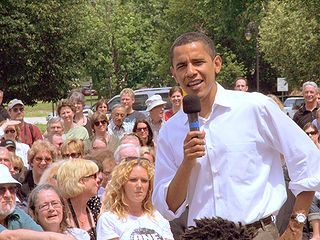U.S. President Obama's “All-of-the-Above” Energy Strategy
A friend of mine who had made some energy-related suggestions to President Obama just received a very thoughtful and well-written note in response, talking up the “all-of-the-above” strategy. I respond:
That’s great. From here, I’d like to see some real numbers and commitments to bringing them about. In particular, I want to see us:
• Immediately remove the subsidies to the oil and coal companies.
• Get entirely out of the coal business over the next 35 – 40 years, with legislation that would force the generators and consumers of energy to pay for its comprehensive costs, including remediating damage to our lungs and ecosystems; encourage the rest of the world to do the same.
• Put people back to work in energy efficiency (insulation, smart-grid, LED lighting, higher efficiency HVAC, etc.) and in rebuilding our ancient grid.
• Invest in R&D in advanced forms of clean energy (PV, CSP, wind, biomass, biofuels, ocean current, tidal, run-of-river hydro, and geothermal), while doing the same with energy storage at a utility-scale level.
• Encourage our cities to redesign themselves in favor of car-sharing, ride sharing, walking, bicycling, mass transit, and small vehicles for commuting and urban package delivery.
• Promote locally-grown food, perhaps by placing a tax on food that travels long distances, and using those revenues to provide incentives for organic food grown via aeroponics, aquaponics, etc.
• Encourage legislation that would force home-sellers to provide energy audits (just like they currently must provide smoke alarms).
• Rethink the way we regulate utilities, so that they have full incentive to integrate renewables and to encourage their customers to consume less power.
• Advance a new ethos of energy conservation, e.g., the Carter White House.
I’d happily give the president a solid “A” if he does a good job here. To make it an “A+” he needs to:
• Make the U.S. a constructive force (rather than an obstruction) in the Conference of Parties meetings on climate change mitigation.
• Encourage Bernie Sanders’ “Saving American Democracy” legislation that will establish a constitutional amendment overturning the U.S. Supreme Court Decision “Citizens United.” Currently, Big Energy, especially the oil companies, essentially own our government, and, as long as that’s the case, real change in energy policy will never happen.
Go for it, Mr.President!



All generally good points but it will be very much a long term thing to get most of these worked on. I’d say getting as many homes as possible insulated would be a good starting point, simply because it can help save on energy used, regardless of the source, so there is a guaranteed reduction in emissions from every property that has it.
Craig,
I doubt you’ll find many of your readers who disagree with many of the broad points you’ve outlined here… But politically this is asking for the impossible. It’s a little unfair to ask for this much in order to give the president an “A”…
There’s a lot to discuss here, so I’ll respond to the first couple of bullets and try to find time later to respond to more.
Obama has been trying to remove 4 billion/year in tax credits to the oil companies now since 2009… He cannot get that passed until and unless we have 60 democrats in the senate and at least 218 democrats in the house. There is simply no possibility that a republican will ever vote to remove those subsidies.
I don’t think that anyone will favor a tax on coal which forces it to pay the cost for all of its externalities. The problem there is that coal may only be ~34-35% of the grid, but instantly all electricity prices would increase by the ~$100+/MWh. That would be a windfall for power companies that has never been equaled, but it would crush manufacturing and residential customers, sending the U.S. into a severe recession, and would immediately result in a harsh backlash.
I think a better policy would be to offer a subsidy for new power construction based on the the amount of those externalities that were abated – so if the decided upon total externality of an average coal plant were ~$130/MWh, and a new coal plant were built which had only $50/MWh of externalities; allowing the decommissioning of the older plant… perhaps a ~$40/MWh subsidy could be provided for the new power plant for the first 5 years of operation. Obviously, a wind farm would have $0/MWh of externalities, so perhaps it might receive $65/MWh in this same scenario…
The upside here is that the benefits only go towards new builds, which would keep costs low and remain targetted towards improvement rather than legacy rewards… and everyone’s power bill becomes lower – advantaging manufacturing which would help jobs and serving as a cost of living break for consumers which would stimulate the economy…
I’ll get to the rest of the items at some point. But I would like to mention that the idea of mandating home energy audits is brilliant, and could provide extra jobs that would end up being paid for by a reduction in energy use – free extra jobs helps everyone while helping the environment.
Unless I’m mistaken, I believe I first heard the the idea of mandating home energy audits from (frequent commenter) Tom Konrad.
And what you write about taxing coal is correct, though I’m confident that I could do this cleverly, such that it would not have the effects you name. Of course, this is a moot point if there ever were one. As you point out, there is no political will here.
Craig,
I think that there could be political will… but only if we’re talking about subsidies rather than taxes. The problem right now is that the subsidies are not goal-based, but rather sporadically apportioned to favor specific industries – which makes those subsidies vulnerable to attack.
If subsidies were based exclusively on the externality costs that were being abated, and the subsidy costs to the taxpayer were clearly less than the externality cost to society… I think you’d have far more political backing.
(A simple example to illustrate: solar power gets FAR more subsidies per MWh than wind power, even though wind power offsets 3-4 MWh of coal-sourced electricity for every 1 MWh of wind-sourced electricity that is produced, with the balance being NG-sourced; while solar power typically offsets ~0.7-0.8 MWh of NG-sourced electricity and ~0.2-0.3 MWh of coal for every MWh of solar energy produced… Essentially solar receives far more subsidies to reduce far less externalities. The fact that such a structure cannot be defended by any form of logic makes those subsidies vulnerable to attack – as the opponents can legitimately claim that eliminating externalities are clearly not a goal of the subsidy structure).
Excellent point. Again, if you and I were asked to come up with something sensible and fair, it wouldn’t be that hard. But, strangely, I don’t hear the phone ringing…..
What’s really required here is fair-mindedness. As long as decisions are being made to favor a concept purely on the basis of how much clout it has, we’re doomed.
Indeed.
Thanks again for doing what you can.
Craig – Your basic assumption is incorrect. The world is not running out of energy. The amount of energy available from local natural sources is sufficient to meet all of our needs, and that would be true even if the world’s population were orders of magnitude larger. What we need are means of storing that local energy because the supply and demand periods are different.
Large amounts of thermal energy (both heat and cold) can be inexpensively stored in the ground (see the Oct issue of http://sustainability-journal.ca for some working examples).
In Canada thermal storage also solves the problem of electricity storage because it eliminates the large winter and summer power demand peaks so that our hydro sources (which naturally provide storage) could cope with the remaining demand fluctuations. Other countries need different solutions.
Flailing about with “all of the above” assumptions and pointless insulation projects is counterproductive. We need to stop using combustible fuels almost completely and that would be much easier to accomplish if we focused on using the available natural energy sources rather than on dead end approaches like relying on “energy efficiency”.
Generally your agenda is headed in the right direction however , “forcing” and “mandates” are not the way to have government accomplish the end goal; these approaches to gaining energy independence only turn the public off (with the exception of a few special interest groups). Investment by the private sector encouraged by a reduction in government regulation would spur the industry better that law suits and fines. Educational programs in our high schools and universities aimed at energy development would be a better way to spend the subsidies now paid to the energy industry including the renewable energies.
Another point concerning the “all of the above” approach: we have to remember that natural gas is or should be considered only as a stepping stone; remember NG is still only 50% cleaner than coal. By building a vast NG generation fleet to provide both base and renewable integration we are consigning ourselves to the same fight down the road when clean renewables should be able to take over providing the majority of our needs. Storage both grid sized and utility sized should be encouraged to replace NG when the time comes to switch over to clean energy totally. Storage does a better and much cleaner job of integration, freq regulation and time shifting. But the fight will be just as hard to eliminate NG as it is with coal now if we allow it without some sunset clause.
I agree forcing and taxing is distasteful to everyone. Economics makes sence to everyone. NG is better fuel than coal used by utilities and they are switching due to economics. Coal is being exported because there is a market out there and that helps our economy. Energy efficientcy and conservation is the best short term approach since it creates jobs in service and manufacturing, saves money and the envirenment, and from the utilities veiw, the cheapest power generation unit is the one that doesn’t have to be built.
America is reactive more than proactive; she’s big and steers slowly.
Let me explain a bit about the cost and time regulations impose on clean energy projects; the company I work for as an independent consultant has spent 5 years, and 100’s of thousands of dollars in the licensing process of an nearly environmentally benign closed loop pumped storage project. Care was taken to site the project where there was little environmental nexus or recreational issues, even threatened and endangered species were part of the siting requirements, however, even though the state and federal service agencies agreed that we couldn’t have picked a better location we still had to spend the time and monies to jump thru the hoops of NEPA just to please the mid level bureaucrats. Even those individuals stated that – though we know the results before hand of each requested study we still want you to do this because its the rule. Sometimes our government does things that make no sense at all.
I strongly support higher efficiency and just plain using less energy.
What really irks me is that all of Washington is in Big Oil’s pockets. I did not see a single Bill in Obama’s first two years when Democrats had control of both House and Senate. Don’t blame it on Republicans, that is just an easy out. Blame it on both parties, but especially Obama because that was one of his 2008 campaign promises!
Politicians only care about getting reflected! Now with Obama, politically finished, I wonder what he will try in his last lame duck 4 years.